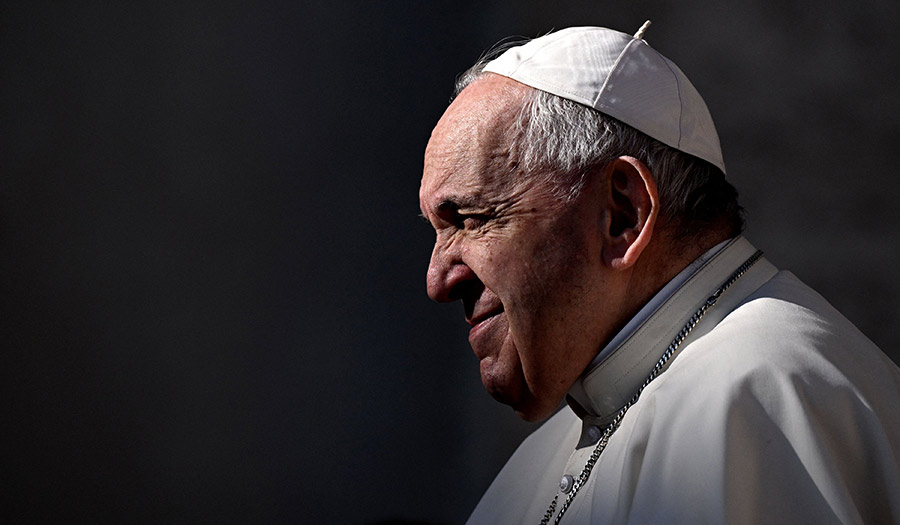 Tiziana FABI/AFP via Getty Images
Tiziana FABI/AFP via Getty Images
Article
The leader of the Catholic Church said there is no turning back from modernizing reforms. His rhetoric signals another flashpoint in the battle between Catholic traditionalists and progressives.
Learn the why behind the headlines.
Subscribe to the Real Truth for FREE news and analysis.
Subscribe NowPope Francis has complained that traditionalist Catholics, particularly in the United States, are “gagging” the church’s modernizing reforms. Even so, he insisted there is no turning back.
Francis told a gathering of Jesuit editors in comments published in mid-June that he was convinced some Catholics simply have never accepted the Second Vatican Council, the meetings of the 1960s that led to Mass being celebrated in the vernacular rather than Latin and revolutionized the church’s relations with people of other faiths, among other things.
“The number of groups of ‘restorers’—for example, in the United States there are many—is significant,” Francis told the editors, according to excerpts published by the Jesuit journal La Civilta Cattolica.
“Restorationism has come to gag the council,” he said, adding that he knew some priests for whom the 16th century Council of Trent was more memorable than the 20th century Vatican II.
Traditionalists have become some of Francis’ fiercest critics, accusing him of heresy for his opening to divorced and civilly remarried Catholics, outreach to homosexual Catholics and other reforms. Francis has taken an increasingly hard line against them, re-imposing restrictions on celebrating the old Latin Mass and taking specific action in dioceses and religious orders where traditionalists have resisted his reforms.
The pope signaled that progressive leadership is ready for a long battle with restorers.
“It is also true that it takes a century for a council to take root. We still have forty years to make it take root, then!” he told the editors.
Traditionalists have similarly dug in their heels. Yet history shows they are fighting a losing battle…
Historical Perspective
The Vatican has a long history of reversals and changes. Once ironclad rules have often been tossed out or softened.
A Foreign Policy article detailed a number of major reversals that have come from the Vatican over the years.
Original rule about usury: “Lend freely, hoping nothing thereby, the Bible teaches. Interpreted literally, this prohibition against profiting on loans played a major role in the creation of the European credit markets during the Middle Ages. Bankers had to devise methods of profiting from moneylending without directly charging interest.”
This rule fell by the wayside during the Renaissance when European capitalism took over—as charging interest is a mainstay of the modern financial system.
Original rule on slavery: “No less an authority than St. Augustine said that Jesus Christ did not make men free from being slaves. As late as 1860, the church taught that it was not a sin to own another human being so long as the slave was treated humanely.”
The church did not take a firm stance against slavery until it was largely forbidden in the West. While Pope Gregory XVI first criticized the practice in 1839, it was not until Leo XIII, the first 20th-century pope, that the Vatican declared slavery a moral outrage.
Original rule about Mass: “Traditionally, Catholic Mass was celebrated in the original Latin, with priests facing away from congregants. More generally, the institutions of the church maintained a level of distance from both followers and the modern world as a whole.”
During the Second Vatican Council in the 1960s, it was decided to allow Mass to be celebrated in local languages. The council also began a number of initiatives including greater dialogue with other faiths and more decentralization of authority from the Vatican to local districts.
Original rule on limbo: “In traditional Catholic theology, limbo is the halfway point between heaven and hell where the unbaptized, including infants, go after death. Even though they had committed no sins, such people had not been cleansed of the original sin through baptism.”
Parishioners never really latched onto the idea of limbo and it was rarely discussed from the pulpit. Foreign Policy wrote: “In 2004, John Paul II formed a commission to come up with a more coherent and enlightened way of describing what happens to infants who die. In 2007, Benedict signed a report recommending the concept be dropped. Instead of going to limbo, unbaptized babies would enjoy eternal happiness after death, but would not achieve communion with God.”
What Everyone Misses
This all brings out important questions for Catholics and Protestants alike: Should Christianity change with the times? Using modern technology and equipment is a given. Yet what about doctrines? Should those adapt as well?
In the culture war of modern Christianity, there is one thing rarely mentioned—if at all. That is what the Bible actually says.
Every churchgoer owes it to themselves to stop and look at God’s Word. Then, they should take a long, hard look at the churches of today. Do these “houses of worship” and their leadership match up to what the Bible says?
Look at what Jesus Christ declared: “But in vain they do worship Me, teaching for doctrines the commandments of men” (Matt. 15:9). Mark 7:7 says the same thing.
A lot of the arguments among modern church leaders are over this: the commandments of men. These are ideas that have no biblical backing.
The celibate priesthood is one example. Notice what I Timothy 3:2 states: “A bishop then must be blameless, the husband of one wife, vigilant, sober, of good behavior, given to hospitality, apt to teach.”
For emphasis, read Titus 1:6, which also states ordained men must be “the husband of one wife, having faithful children not accused of riot or unruly.”
Do not overcomplicate this. While some ministers may be single, the apostle Paul—inspired by God—clearly stated they can marry and have children.
Another example of “teaching for doctrines the commandments of men” is taking days with pagan origins and adopting them for “Christian” worship. Jeremiah 10 is clear: “Thus says the Lord, Learn not the way of the heathen, and be not dismayed at the signs of heaven; for the heathen are dismayed at them” (vs. 2).
The pagan roots of Christmas and Easter are well known. Ask: Would God allow these heathen days—even if they are repurposed—especially when the days He commands are swept aside?
Note that God commanded His weekly Sabbath day and annual Holy Days to be “a perpetual covenant” (Ex. 31:16; 12:20, 24).
Read what God says in Exodus 31: “It is a sign between Me and the children of Israel forever: for in six days the Lord made heaven and earth, and on the seventh day He rested, and was refreshed” (vs. 17).
While the leaders of modern Christianity squabble over the future of their churches, you should focus instead on what your Creator wants. Ignore the political wrangling and petty arguments over tradition!
You need to prove to yourself the Bible is God’s Word. Make I Thessalonians 5:21 your guiding light: “Prove all things; hold fast that which is good.”
While society is well into an era of redefining what “church” is and its teachings, the Bible remains as relevant as ever: “But the word of the Lord endures forever” (I Pet. 1:25).
In addition, God declares “I change not” in Malachi 3:6, and Hebrews 13:8 states that “Jesus Christ is the same yesterday, today, and forever” (NKJV).
Read Bible Authority...Can It Be Proven? to begin to understand what God wants for your life.
This article contains information from The Associated Press.



